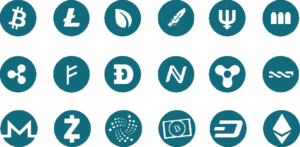

Altcoins are tokens created on a blockchain which is not the original Bitcoin. These could simply be a copy or for of the original Bitcoin or it could be a completely different blockchain with different properties and purpose.
- We group all cryptographically secured tokens other than Bitcoin together. They collectively make up the altcoin eco system.
- Some coins use PoW to reach consensus and others use PoS. There are many other proposals to consensus algorithms but mostly failed to make any impact.
- We call them shitcoins due to the prevalence of altcoins which launch to great fanfare, but never reach any material goals. We simply remember them as pump and dump schemes. There are some good projects, they simply the minority… woof woof… DOGE.
- The most successful altcoin at the moment is Ethereum, which has its ability to create altcoins, to thank for its popularity…
Which Altcoin will Dethrone Bitcoin?
Bitcoin is still the King of Crypto’s in terms of market cap and dollar value. In order for an alternative to beat Bitcoin it will need to revolutionise the crypto industry which itself is a challenger to the status quo. The most interesting altcoins are ones that build on top of other protocols as it brings bigger communities to its support base, which result in higher token value over the long run.
Ethereum give incredible utility to holders of its ETH cryptocurrency which is an altcoin. This utility drives up the value of the token. Whilst it is second only to Bitcoin, it has struggled to deliver on the delivery of Ethereum 2.0 which is promised to be a PoS based protocol.
How and Where to Trade Alternative Tokens
You can trade altcoins almost everywhere you can Bitcoin. Furthermore you can trade or earn these tokens on centralised or decentralised platforms. Trading volume and chain analysis suggest that Binance is the most prolific centralised exchange. Its selection of altcoin, bitcoin and FIAT trading pairs more liquid than most other venues. DEX trading platforms like Uniswap have come to prominence lately. However, the high cost of GAS fees on the Ethereum network has hampered growth.
Are NFTs Altcoins?
NFTs are technically not Altcoins because they are by definition non-fungible. However, we can see them as alternative crypto assets because they represent digital media which may have value. You can also trade them. Ultimately you tie your ownership of an NFT to a crypto address on a blockchain.
How to Earn Altcoins with DeFi
DeFi protocols such as Aave allow participants to earn interest in the form of AAVE (aka LEND) tokens. Uniswap is a very popular DEX that allows users to swap almost any ERC20 token pair without any 3rd party. Liquidity providers must stake both sides of the liquidity pool in a 50/50 ratio. In return they earn a proportion of transaction fees as well as the UNI governance token.